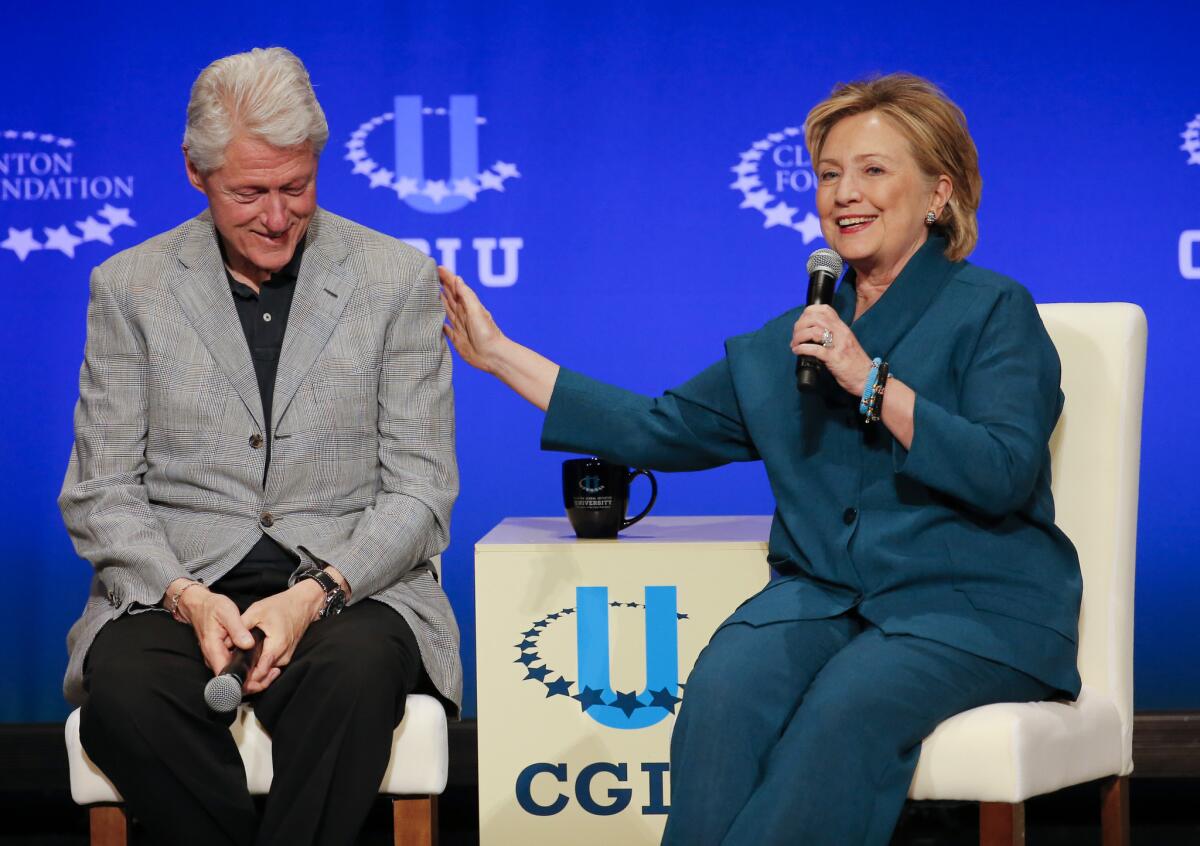Op-Ed: Good for the Bushes and the Clintons, but not good for America

- Share via
A few years ago, I found myself sitting on an airplane next to a gentleman from Egypt. Talk quickly turned to the upheaval in his country, where the so-called Arab Spring was in full bloom.
“We want a real democracy,” he told me, “not like yours.” When I pressed him to elaborate, he shot back with a question of his own. “How many times have you voted,” he asked, “when someone named ‘Bush’ or ‘Clinton’ wasn’t running?”
The answer, I sheepishly admitted, was once: in 2008. Before that — going back to 1980, the first year I cast a ballot — every single presidential ticket featured someone from one of those two families.
That’s not good for our image overseas, or for our democracy at home. We tell the world that we’re a land of opportunity, where anyone can grow up to be the president. Then we limit ourselves to a handful of political dynasties.
Lately, there’s been a lot of talk of another Clinton versus Bush contest. With her huge fundraising apparatus and name recognition, Hillary Rodham Clinton is the hands-down Democratic front-runner for 2016. Meanwhile, Jeb Bush seems to be laying the groundwork to capture the GOP nomination.
Of course, neither Clinton nor Bush has announced any such plan. But the “super PAC” Ready for Hillary has already raised $4 million simply to “encourage” her to run. And Bush is canvassing the country like a presidential candidate, visiting three states over the next few weeks to campaign for fellow Republicans.
Of course, they’re hardly the first American politicians to exploit family connections. Our sixth president, John Quincy Adams, was the son of our second one; Benjamin Harrison’s grandfather William spent a very brief time in the White House half a century earlier; Franklin D. Roosevelt was preceded by Theodore, his distant cousin.
More recently, consider New York Govs. Cuomo (Mario and Andrew) or the Al Gores, Sr. and Jr., who served as senators from Tennessee. And then there are the Kennedys, who made no bones about their dynastic ambitions.
Joseph P. Kennedy drafted his son John into politics after the death of JFK’s older brother. And when JFK vacated his Massachusetts Senate seat to enter the White House, his father anointed the youngest Kennedy, 30-year-old Teddy, as his successor. “Look, I spent a lot of money for that Senate seat,” Joseph Kennedy said. “It belongs in the family.”
But we’ve never had a time when presidential politics is as dominated by a few select bloodlines. That limits the pool of eligible national leaders, which is bad enough. But it also makes it harder for them to govern once they get to the White House, where they must simultaneously demonstrate fealty to the family and independence from it.
That’s the story of George W. Bush, who frequently pulled out his birth certificate during his first political campaign — a failed bid for Congress in 1978 — to show that his middle name was different from his father’s. “Would you like me to run as Sam Smith?” a frustrated Bush asked. “The problem is I can’t abandon my background.”
Once he became president, though, Bush also had to prove he was his own man. His invasion of Iraq was at least partially motivated by his father’s refusal to occupy it during the Persian Gulf War. But it also appeared to be aimed at exacting revenge on Saddam Hussein, who had plotted to assassinate the elder Bush. “This is the guy who tried to kill my dad,” Bush told a campaign rally, six months before the Iraq invasion. Never mind that President Clinton had earlier ordered a missile strike on Iraq to retaliate for the plot. This was about family.
And make no mistake, another Clinton presidency would be about family too. One way or another, everything Hillary Clinton does will address her husband’s legacy. His fundraising acumen powered her ascent into the Senate, and he’d obviously be a key player in her presidency, just like she was in his.
As for Jeb Bush, nobody will forget that he was governor of Florida when a highly controversial recount there catapulted his brother into the White House. Bush has said that he moved from Texas to Florida to “get out from [his] father’s shadow.” Yet he’ll never be able to escape it, or his brother’s.
“Dynasty, shmynasty,” Jeb Bush quipped in 2000, dismissing the concept. But at least one member of the family recognizes its dangers. “If we can’t find more than two or three families to run for office, that’s silly,” Jeb’s mother, Barbara, said in an interview in January. “The Kennedys, Clintons, Bushes — there are just more families than that.”
She’s right. It’s time to send a different one to the White House. That’s what a real democracy would do.
Jonathan Zimmerman teaches history and education at New York University. His most recent book is “Small Wonder: The Little Red Schoolhouse in History and Memory.”
More to Read
A cure for the common opinion
Get thought-provoking perspectives with our weekly newsletter.
You may occasionally receive promotional content from the Los Angeles Times.






